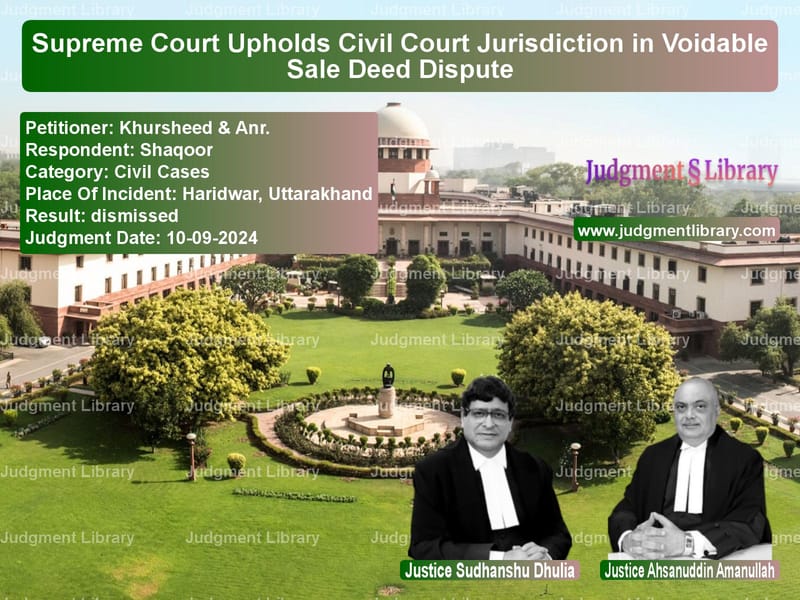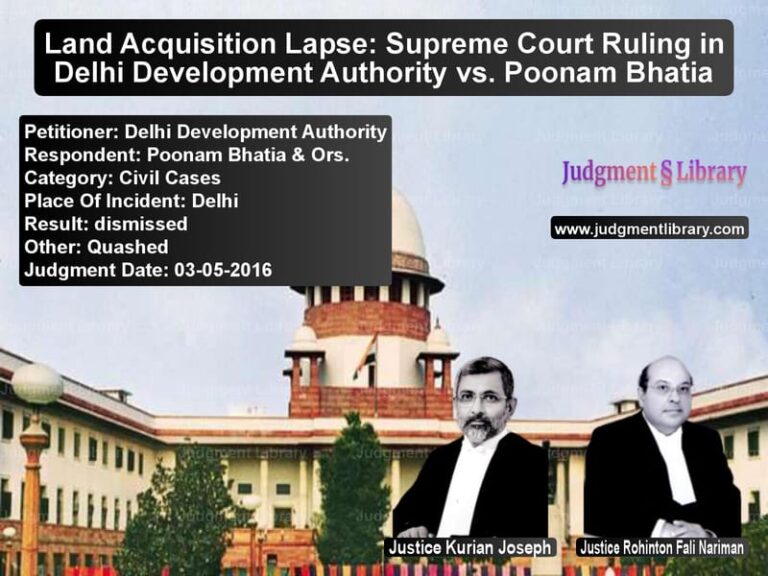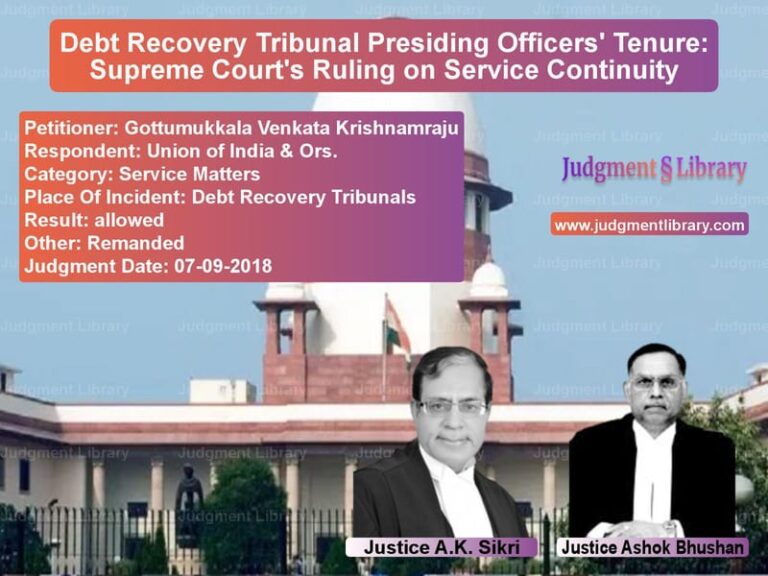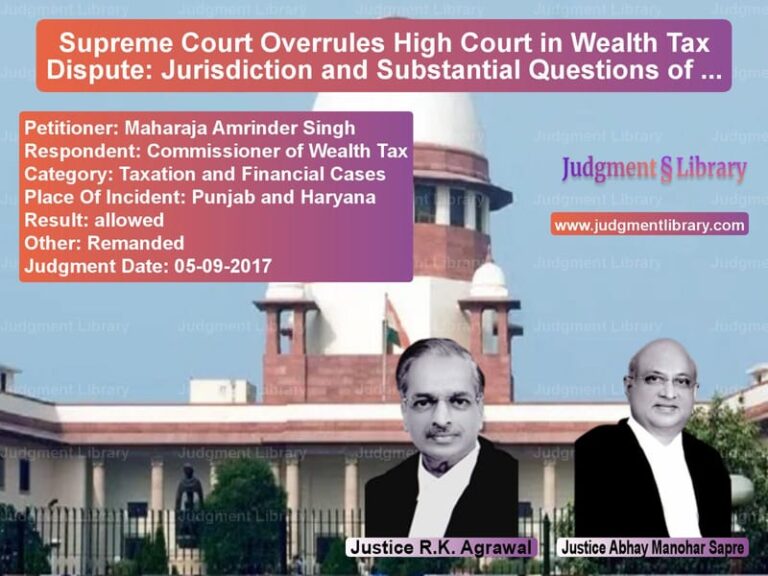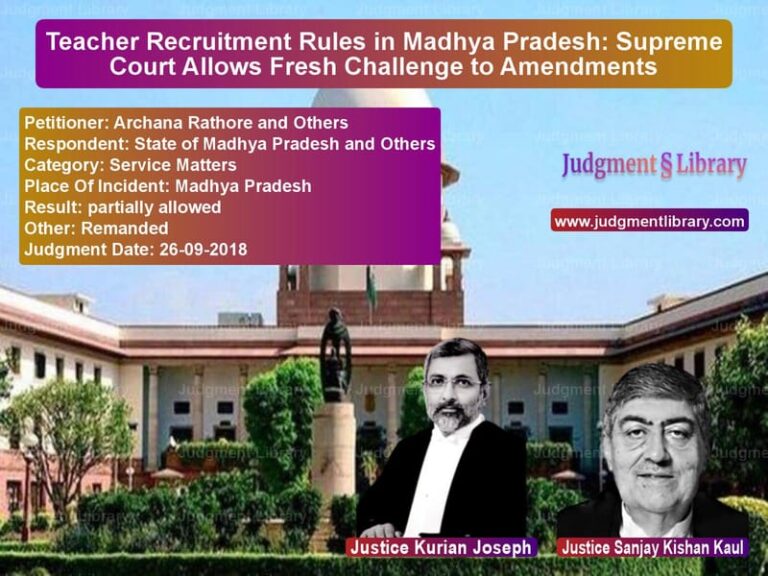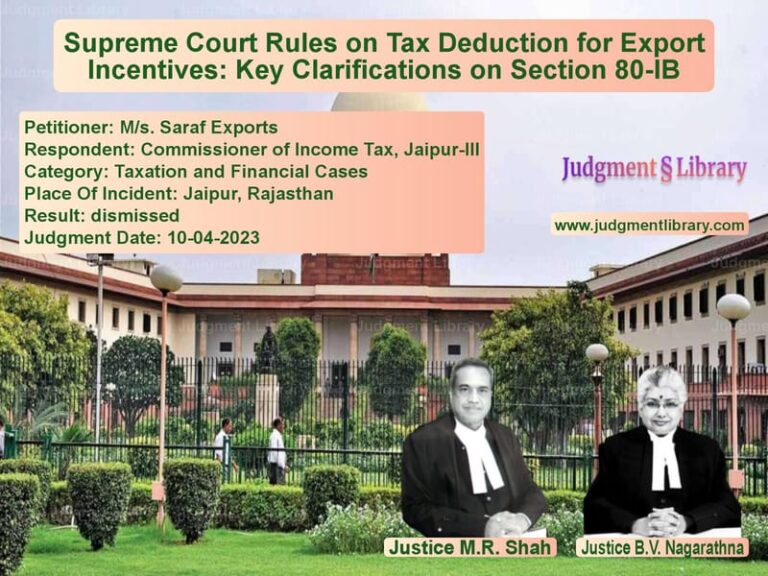Supreme Court Upholds Civil Court Jurisdiction in Voidable Sale Deed Dispute
The case of Khursheed & Anr. vs. Shaqoor involved a legal dispute over the validity of a sale deed executed through alleged fraud and impersonation. The Supreme Court, in its judgment dated September 10, 2024, upheld the jurisdiction of the Civil Court in matters concerning the cancellation of voidable sale deeds, ruling that such disputes do not fall under the exclusive jurisdiction of Consolidation Authorities under the U.P. Consolidation of Holdings Act, 1954.
This case clarifies the legal distinction between void and voidable documents and reaffirms the principle that only competent Civil Courts have the authority to cancel voidable sale deeds.
Background of the Case
The dispute concerns agricultural land bearing Khata Nos. 154 and 154A in Haridwar, Uttarakhand. The facts leading to the litigation are as follows:
- Ilahibaksh, the original owner, had three sons: Shafi, Gafoor, and Shaqoor (respondent).
- After Ilahibaksh’s death, the land was equally inherited by his three sons.
- Shafi’s daughter, Haneefa (mother of Petitioner No. 1), allegedly claimed ownership of Gafoor’s share through fraudulent misrepresentation.
- Haneefa then executed a sale deed dated August 9, 2016, in favor of Petitioner No. 2, alienating the property without having legal ownership.
Claiming fraud and impersonation, Shaqoor filed a suit in the Civil Court for cancellation of the sale deed.
Legal Proceedings
Trial Court Proceedings
- The petitioners (defendants) filed an application seeking abatement of the suit under Section 5(2)(a) of the U.P. Consolidation of Holdings Act, 1954, arguing that the matter should be decided by Consolidation Authorities.
- The Trial Court accepted their plea and ruled that the suit stood abated due to ongoing consolidation proceedings.
Appeal Before the Additional District Judge
- The respondent, Shaqoor, filed an appeal challenging the Trial Court’s decision.
- The Additional District Judge upheld the Trial Court’s order, ruling that the matter fell under the purview of Consolidation Authorities.
Writ Petition Before the Uttarakhand High Court
- Shaqoor then filed a Writ Petition under Article 226/227 of the Constitution before the Uttarakhand High Court.
- The High Court, relying on the Supreme Court’s precedents, ruled that the sale deed was voidable and therefore, the Civil Court had jurisdiction to decide its validity.
- It ordered the restoration of the suit to the Civil Court for adjudication.
Appeal Before the Supreme Court
The petitioners challenged the High Court’s decision before the Supreme Court, arguing:
- The dispute involved agricultural land and therefore fell under the exclusive jurisdiction of Consolidation Authorities.
- The Civil Court had no jurisdiction to hear matters relating to rights in agricultural land once consolidation proceedings had been notified.
- The sale deed in question should be adjudicated by the Consolidation Courts rather than the Civil Court.
Supreme Court’s Observations
The Supreme Court, comprising Justices Sudhanshu Dhulia and Ahsanuddin Amanullah, analyzed the legal distinction between void and voidable documents.
1. Distinction Between Void and Voidable Sale Deeds
The Court reaffirmed that:
- A void deed is one that has no legal effect from inception and can be disregarded by any authority, including Consolidation Authorities.
- A voidable deed remains valid unless set aside by a competent Civil Court.
The Court cited Ningawwa v. Byrappa (1968), which held that fraud affecting the execution of a document (as opposed to its contents) renders it voidable, requiring cancellation by a Civil Court.
2. Consolidation Authorities Cannot Cancel Voidable Sale Deeds
- The Supreme Court ruled that Consolidation Authorities cannot adjudicate fraud-related disputes that require the cancellation of sale deeds.
- The judgment cited Ram Sakal Singh v. Mosamat Monako Devi (1997), where the Court held that Consolidation Authorities lack jurisdiction to cancel registered sale deeds.
3. Civil Court’s Jurisdiction Remains Intact
- The Court upheld that a suit for the cancellation of a voidable sale deed does not abate under Section 5(2)(a) of the U.P. Consolidation of Holdings Act.
- The Civil Court retains jurisdiction to decide disputes involving fraud, misrepresentation, or impersonation.
4. Dismissal of Special Leave Petition
The Supreme Court concluded:
- The High Court’s order restoring the civil suit was legally sound.
- The appeal lacked merit and was accordingly dismissed.
- The Civil Court was directed to proceed with the case without any procedural delays.
Final Judgment
The Supreme Court ruled:
- The sale deed in question was voidable, requiring adjudication by the Civil Court.
- The High Court’s order restoring the suit was upheld.
- The Special Leave Petition was dismissed.
Implications of the Judgment
This ruling carries significant legal implications:
- Reaffirmation of Civil Court Jurisdiction: The judgment establishes that Consolidation Authorities cannot decide matters involving fraudulent transactions.
- Protection Against Fraud: Individuals cannot escape scrutiny by misusing consolidation laws to evade civil litigation.
- Guidance on Land Disputes: The ruling provides clarity on where land-related disputes should be adjudicated based on whether a document is void or voidable.
- Judicial Oversight: The decision ensures that sale deeds executed under fraudulent circumstances are examined by competent Civil Courts.
The Supreme Court’s decision reaffirms the principle that legal remedies for fraudulent transactions must remain accessible through Civil Courts, preventing wrongful land transfers under the guise of consolidation proceedings.
Petitioner Name: Khursheed & Anr..Respondent Name: Shaqoor.Judgment By: Justice Sudhanshu Dhulia, Justice Ahsanuddin Amanullah.Place Of Incident: Haridwar, Uttarakhand.Judgment Date: 10-09-2024.
Don’t miss out on the full details! Download the complete judgment in PDF format below and gain valuable insights instantly!
Download Judgment: khursheed-&-anr.-vs-shaqoor-supreme-court-of-india-judgment-dated-10-09-2024.pdf
Directly Download Judgment: Directly download this Judgment
See all petitions in Property Disputes
See all petitions in Landlord-Tenant Disputes
See all petitions in Public Interest Litigation
See all petitions in Judgment by Sudhanshu Dhulia
See all petitions in Judgment by Ahsanuddin Amanullah
See all petitions in dismissed
See all petitions in supreme court of India judgments September 2024
See all petitions in 2024 judgments
See all posts in Civil Cases Category
See all allowed petitions in Civil Cases Category
See all Dismissed petitions in Civil Cases Category
See all partially allowed petitions in Civil Cases Category

